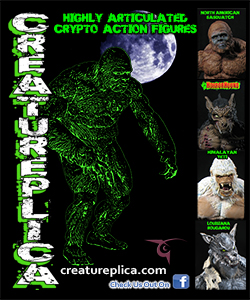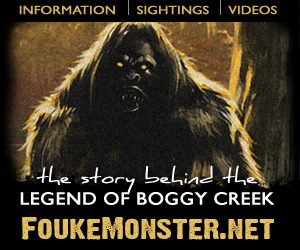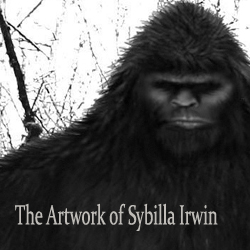Cryptozoology and Magic
Posted by: Craig Woolheater on January 31st, 2006
Last week, while scouring the newswires for cryptozoological news items, I came across a story about a Texas-based magician, Brian Brushwood . The following quotes piqued my interest.
Then, his second hour will focus on the secrets of his magic, how to spot fakes and how to not get ripped off. Brushwood will tell the secrets of street cons, psychic mediums, psychic surgery, crop circles, aliens, UFOs and ESP.
Brushwood calls the second half of his performance "Scams, Sasquatch and the Supernatural."
In this segment, he will go into detail about cryptology, unveiling the secrets of Bigfoot and the Loch Ness Monster. Then, he will talk about the increasingly popular "scam" of spiritualism, or talking to dead people.
I went to his website and sent him the following email:
I just read the article on the Missouri Southern State University Charter Online website. I’m sure that it meant to say cryptozoology. I am extremely curious what the secrets of Bigfoot and the Loch Ness Monster are that you unveil?
Today, Brian sent me the following reply by email:
That’s funny about the cryptology thing. It’s amazing how well-meaning people tend to get so many details wrong (which is actually one of the points I make in the lecture: people have a tendency to vastly
underestimate the amount of human error inherent in all testimonials, and memory in general).
It is true that I don’t find evidence for cryptozoological creatures very compelling, but in my lecture I’m very careful not to tell the students what to believe: If they believe what I do, just because I tell them to, then they’d be right for the wrong reasons… and no better able to think for themselves when they encounter strange phenomena.
I try to encourage critical thinking in the students. I explain and demonstrate how flawed memory is, including doing an experiment wherein 80% of the audience experiences a false memory. I demonstrate how easy it is to create very compelling hoaxes, and how often natural phenomena can be confused for supernatural phenomena.
Unfortunately, I don’t get to dedicate much of the lecture to the big hairy guy. With belief in Sasquatch under 15%, I have to dedicate more of the lecture’s time to other subjects. But I do talk briefly about Ray Wallace (the "father of bigfoot"  , and how after his death his family revealed the extent and depth of his hoaxes.
, and how after his death his family revealed the extent and depth of his hoaxes.
And I tell a quick story about the Blijdorp Zoo in Holland in 1979: Just before opening a new exhibit featuring a panda bear cub, the panda escaped. The local newspaper was called, and it was requested that anyone who had seen the cub should call a certain phone number. Two hours before the newspaper hit the stands, they found the body of the panda bear cub: it had been hit by a train right behind the zoo.  Now here’s the amazing part: in the two days it took the newspaper to update the story, the zoo received over ONE THOUSAND PHONE CALLS from people as far as 70 miles away who had seen the panda bear cub, even though it was already confirmed that the cub was dead.
Now here’s the amazing part: in the two days it took the newspaper to update the story, the zoo received over ONE THOUSAND PHONE CALLS from people as far as 70 miles away who had seen the panda bear cub, even though it was already confirmed that the cub was dead.
Now this could mean that there’s ANOTHER panda bear cub running around Holland, or it could mean that honest, intelligent people have a phenomenal ability to see what they want to see. As philosopher Karl Popper put it: "It is easy to find confirmations for any theory, if we look for confirmations."
Again, none of this is to say that there can’t be a bigfoot running around… After all, it’ll only take one captured or killed bigfoot to put the debate immediately to bed. But until then, it seems that our best evidence is stories and testimonials (which can way too easily be misremembered or misinterpereted), and photographs/video (which can way too easily be hoaxes or misinterpretations of natural phenomena).
Obviously, the topic of bigfoot could merit a very in-depth 2-hour lecture on his own, so with only 5 minutes to speak on the subject, I have to settle for throwing out a little "food for thought" on the subject. I try very hard to be respectful in my talks, and offer scientific counterpoints and new ideas to the students, rather than resort to name calling.
Except for people who "talk to the dead." In my opinion, those guys are profiting from the grief of others, and are the lowest form of life.
Brian Brushwood
Bizarre Magic, Inc.
About Craig Woolheater
Co-founder of Cryptomundo in 2005.
I have appeared in or contributed to the following TV programs, documentaries and films:
OLN's Mysterious Encounters: "Caddo Critter", Southern Fried Bigfoot, Travel Channel's Weird Travels: "Bigfoot", History Channel's MonsterQuest: "Swamp Stalker", The Wild Man of the Navidad, Destination America's Monsters and Mysteries in America: Texas Terror - Lake Worth Monster, Animal Planet's Finding Bigfoot: Return to Boggy Creek and Beast of the Bayou.









It’s good to hear that magician Brian Brushwood is endeavoring to induce critical thinking during his presentations to students, but it looks as if he needs to reconsider some of his illustrations.
For example, he says, “If [students] believe what I do, just because I tell them to, then they’d be right for the wrong reasons… and no better able to think for themselves when they encounter strange phenomena.” This is all well and good, but then he proceeds to demonstrate his own gullibility by citing his belief in news accounts supposedly revealing “the extent and depth of [Ray Wallace’s] hoaxes.”
Decrying, on the one hand, how “honest, intelligent people have a phenomenal ability to see what they want to see,” Brushwood demonstrates, on the other hand, his ability to believe what he wants to believe, providing an even more compelling example of Popper’s axiom than would-be sasquatch witnesses.
Sleight of hand, meet sleight of thought.
Not that I actually think Brushwood is being disingenuous, he simply pushes his analogies too far. If anything, he may also be a victim of sorts of (what seems to me to be) the sad fact that genuine investigative journalism is becoming a lost art.
Many journalists accept any tripe that comes over the lines as truth. If someone somewhere writes, for example, “family admits dad invented bigfoot,” other reporters slavishly pass on the story without assessing the legitimacy of the information for themselves. The public, all too often, also believes what they are fed by the media, as illustrated by our well-meaning magician friend.
I remember when the Wallace family mess happened. Shep Smith, a well-known anchor at Fox News, passed on the wacky story like it was gospel. Evidently no one at Fox thought to do so much as checking to see if the prominently displayed track stompers matched the casts of the tracks Wallace supposedly hoaxed.
It’s “safe” to belittle sasquatch-related stories. No one of any significance is standing guard to hold media representatives accountable for sloppy reporting. Similarly, Brushwood claims to “offer scientific counterpoints” to the assertions of sasquatch proponents, but his actual argument is simply that all things sasquatchian are “misremembered or misinterpereted” or hoaxed.
I guess I’m glad he’s being respectful.
Opinions are like a certain part of our anatomy, everybody has one and Mr. Brushwood is entitled to his.
Mr. Brushwood’s primary sin is accepting published accounts instead of investigating further. He seems completely unaware of the physical evidence (prints, etc.) and has accepted hearsay as the “final word” vis a vis Ray Wallace.
At the same time, he is not simply dismissive and admits to not devoting a lot of time or attention to the issue. That said, he would have done better to leave crypto out of his show if he wasn’t able to spend any real time on it.
Alton Higgins said it best.
I’ll bet Mr. Brushwood has a hard time being certain of anything at all, considering how many different ways he knows of that people can be deceived. Just imagine him having a genuine bigfoot encounter and all of the pre-conceived “alternatives” which would dominate, or rather cloud, his mind and cause him to deny the obvious and propose the obscure. The greatest magician is one who is able to fool even his own self.
Also, although philosopher Karl Popper said it is easy to find confirmations for any theory if we look for confirmations, confirmations by themselves are inherently self-serving and only meaningful when they are compared to and agree with reality.
To find an explanation for a question is not difficult at all – it only requires imagination; but to find an explanation which is supported by reality is to discover truth and not need your imagination.
I think Mr. Brushwood, when talking about the panda incident, must have meant that a red (or lesser) panda had escaped. Currently I work at Blijdorp Zoo, and they have been keeping red pandas for a long time. Giant pandas have never been kept in Dutch Zoos.
People will always think that just because they have invested time and effort into proving themselves right, that nothing can be to the contrary.
Sure, people can see what they want. Kids do this all the time – take a child and scare them with a strange adult and in their minds a monster came after them – and is as valid to them as any other “real” person.
Hunters shoot other hunters all the time, claiming that the other guy looked like the prey animal. Its a common boo-boo.
It’s human nature to see something strange and make it fit according to currently known information. However, footprints, photographic evidence, and objective proof should be taken at value – if it can be proven, then let it be proven.
The problem isn’t that the proof is not compelling, its that people will cling to a belief, no matter how false it’s proven, because belief can’t be overridden with logic.
That being said, I don’t believe in Sasquatch, but I have a pretty good idea that something odd is out there and I would like to find it.
Did any of you notice that this guy truly has no idea what he is talking about, just like I don’t have a clue what CRYPTOLOGY is, but do know CRYPTOZOOLOGY.
Always have to question ‘debunkers’ when they trace the Bigfoot/Sasquatch back to some hoax or so-called hoax in the 1900s and call it good – debunked. That’s all fine for them except the fact there is a tradition of reports dating back to pre-Columbian times (to put it bluntly, pre-white folk) here in the United States, and no telling how far they go back in other parts of the world.
I have found out that cryptology is the study of codes.